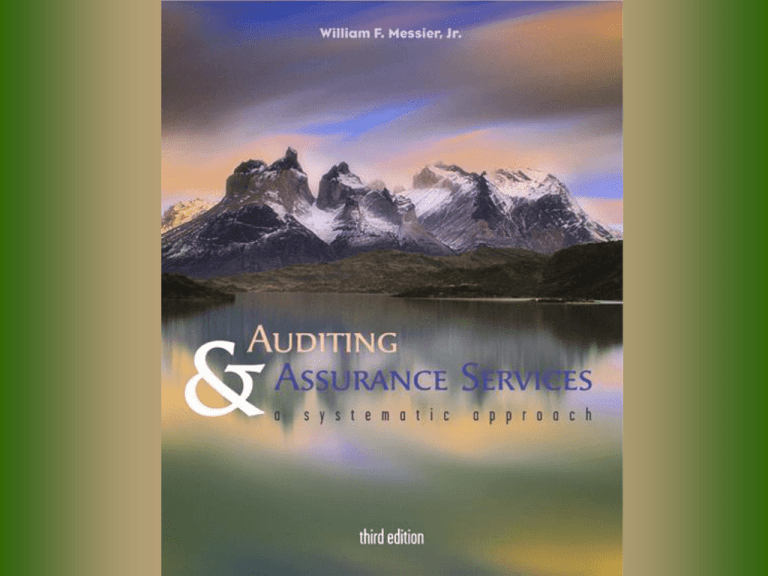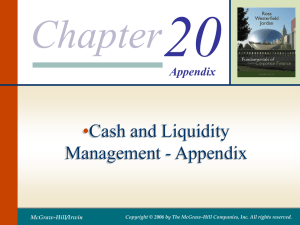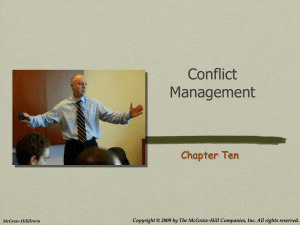
16-1
McGraw-Hill/Irwin
© 2003 The McGraw-Hill Companies, Inc., All Rights Reserved.
16-2
McGraw-Hill/Irwin
Part Five
AUDITING
BUSINESS PROCESSES
© 2003 The McGraw-Hill Companies, Inc., All Rights Reserved.
16-3
McGraw-Hill/Irwin
Chapter 16
CHAPTER 16
AUDITING CASH AND
INVESTMENTS
© 2003 The McGraw-Hill Companies, Inc., All Rights Reserved.
16-4
CASH AND THE EFFECT OF OTHER
BUSINESS PROCESSES
McGraw-Hill/Irwin
Cash represents currency on hand and cash on
deposit in bank accounts including certificates of
deposit, time deposits, and savings accounts.
Virtually all accounting transactions pass through
the cash account as part of their "cradle-to-grave"
cycle and thus cash is affected by the entity's other
business processes.
Figure 16-1 shows the effect that each major business
process has on the cash account.
© 2003 The McGraw-Hill Companies, Inc., All Rights Reserved.
16-5
TYPES OF BANK ACCOUNTS
McGraw-Hill/Irwin
General cash account
Imprest accounts
Branch accounts
© 2003 The McGraw-Hill Companies, Inc., All Rights Reserved.
16-6
SUBSTANTIVE TESTS OF
TRANSACTIONS - CASH
McGraw-Hill/Irwin
Table 16-1 contains examples of substantive tests of
transactions for both cash receipts and cash
disbursements.
On most audits, the substantive tests of transactions
for cash receipts and cash disbursements are
conducted with the tests of controls for the revenue
and purchasing processes, respectively.
© 2003 The McGraw-Hill Companies, Inc., All Rights Reserved.
16-7
ANALYTICAL PROCEDURES - CASH
Because of its residual nature, cash does not have a
predictable relationship with other financial
statement accounts, thus the use of analytical
procedures is limited.
This limited use of analytical procedures is normally
offset by (1) extensive tests of controls and/or
substantive tests of transactions for cash receipts and
cash disbursements or (2) extensive tests of the
entity's bank reconciliations.
McGraw-Hill/Irwin
© 2003 The McGraw-Hill Companies, Inc., All Rights Reserved.
16-8
TESTS OF ACCOUNT BALANCES CASH
McGraw-Hill/Irwin
The reliability of the client's control procedures over
cash receipts and cash disbursements affects the
nature and extent of the auditor's substantive tests of
cash balances.
A major internal control procedure that directly
affects the audit of cash is the completion of a
monthly bank reconciliation by client personnel who
are independent of handling and recording cash
receipts and cash disbursements.
© 2003 The McGraw-Hill Companies, Inc., All Rights Reserved.
16-9
AUDIT OBJECTIVES - CASH
McGraw-Hill/Irwin
Table 16-2 summarizes the audit objectives and
tests of account balances for cash accounts.
The major audit procedures for each cash account
involve tests of the bank reconciliation.
© 2003 The McGraw-Hill Companies, Inc., All Rights Reserved.
16-10
AUDITING THE
GENERAL CASH ACCOUNT
McGraw-Hill/Irwin
The main source of evidence for the validity,
completeness, mechanical accuracy, and valuation
objectives is the audit work completed on the bank
reconciliation.
The following documents are obtained :
A copy of the bank reconciliation.
A standard bank confirmation.
A cutoff bank statement.
Review Exhibit 16-1.
© 2003 The McGraw-Hill Companies, Inc., All Rights Reserved.
16-11
FRAUD-RELATED
AUDIT PROCEDURES
Extended bank reconciliation procedures.
Proof of cash (see Exhibit 16-3).
Tests for kiting (see Exhibit 16-4).
McGraw-Hill/Irwin
© 2003 The McGraw-Hill Companies, Inc., All Rights Reserved.
16-12
AUDITING A PAYROLL OR BRANCH
IMPREST ACCOUNT
The audit of any imprest cash account such as payroll
or a branch account follows the same basic audit steps
discussed under the audit of the general cash account
except the testing is less extensive.
McGraw-Hill/Irwin
© 2003 The McGraw-Hill Companies, Inc., All Rights Reserved.
16-13
AUDITING A PETTY CASH FUND
McGraw-Hill/Irwin
Control procedures.
Audit tests.
© 2003 The McGraw-Hill Companies, Inc., All Rights Reserved.
16-14
SAMPLE DISCLOSURE ITEMS
FOR CASH
McGraw-Hill/Irwin
Policy for defining cash and cash equivalents.
Any restrictions on cash such as a sinking fund
requirement for funds allocated by the entity's
board of directors for special purposes.
Contractual obligations to maintain compensating
balances.
Cash balances restricted by foreign exchange
controls.
Letters of credit.
© 2003 The McGraw-Hill Companies, Inc., All Rights Reserved.
16-15
INVESTMENTS
Entities frequently invest their excess cash in
securities of other entities (e.g., equity securities such
as common and preferred stock, debt securities such
as notes and bonds, and hybrid securities such as
convertible bonds and stocks).
The accounting for such instruments is affected by
factors such as the percentage of the other entity
owned, the degree of influence exercised over the
entity, the classification of the investment as a current
or noncurrent asset, and other factors.
McGraw-Hill/Irwin
© 2003 The McGraw-Hill Companies, Inc., All Rights Reserved.
16-16
CONTROL RISK ASSESSMENT INVESTMENTS
McGraw-Hill/Irwin
The auditor must have a reasonable understanding
of internal control over investments so that the types
of misstatements that may occur can be anticipated
in order to plan the substantive tests.
The main internal control objectives that are of
concern to the auditor are validity, authorization,
completeness, valuation and classification.
© 2003 The McGraw-Hill Companies, Inc., All Rights Reserved.
16-17
VALUING DEBT AND EQUITY
SECURITIES
McGraw-Hill/Irwin
FASB No. 115, "Accounting for Certain Investments in
Debt and Equity Securities" classifies investments into
three categories:
Held-to-maturity securities that are reported at
amortized cost.
Trading securities that are reported at fair value,
with unrealized gains and losses included in
earnings.
Available-for-sale that are reported at fair value,
with unrealized gains and losses excluded from
earnings and reported in a separate component of
shareholders' equity.
© 2003 The McGraw-Hill Companies, Inc., All Rights Reserved.
16-18
SEGREGATION OF DUTIES INVESTMENTS
McGraw-Hill/Irwin
The initiation function should be segregated from
the final approval function.
The valuation-monitoring function should be
segregated from the acquisition function.
Responsibility for maintaining the securities ledger
should be separated from that of making entries in
the general ledger.
Responsibility for custody of the securities should be
separated from that of accounting for the securities.
© 2003 The McGraw-Hill Companies, Inc., All Rights Reserved.
16-19
SUBSTANTIVE TESTS OF
INVESTMENTS
McGraw-Hill/Irwin
It is generally more efficient to follow a substantive
strategy for auditing investments.
Because of the nature of the audit work, substantive
tests of transactions are seldom used as a source of
evidence.
© 2003 The McGraw-Hill Companies, Inc., All Rights Reserved.
16-20
ANALYTICAL PROCEDURES INVESTMENTS
McGraw-Hill/Irwin
Comparison of the balances in the current year’s
investment accounts with prior years' balances
after consideration of the effects of current year
operating and financing activities on cash and
investments.
Comparison of current-year interest and dividend
income with reported income for prior years and
with the expected return on investments.
© 2003 The McGraw-Hill Companies, Inc., All Rights Reserved.
16-21
SUBSTANTIVE TESTS OF
INVESTMENTS
McGraw-Hill/Irwin
Table 16-5 summarizes the tests of investment
account balances for each audit objective.
© 2003 The McGraw-Hill Companies, Inc., All Rights Reserved.
16-22
McGraw-Hill/Irwin
Chapter 16
CHAPTER 16
AUDITING CASH AND
INVESTMENTS
© 2003 The McGraw-Hill Companies, Inc., All Rights Reserved.









